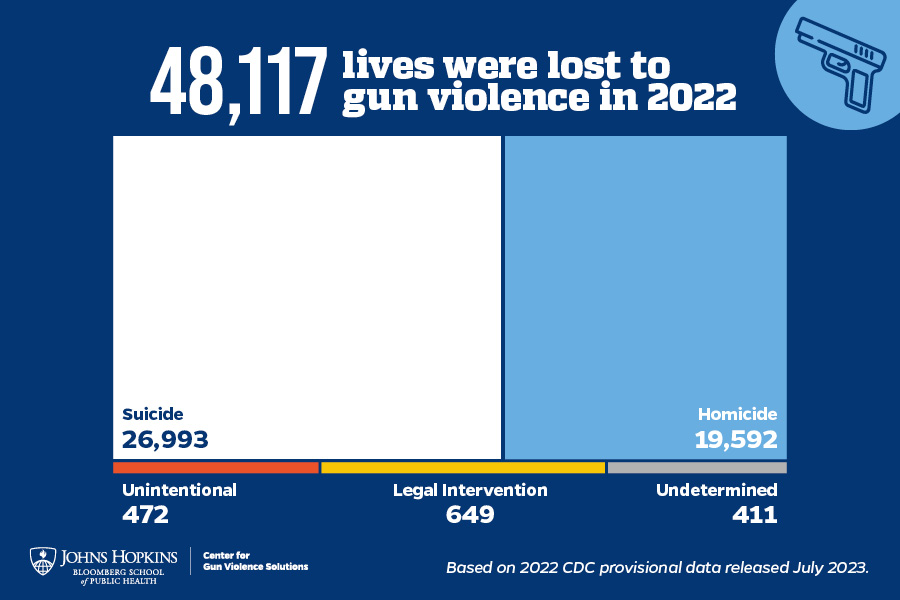GOP Budget Cuts Threaten CDC Research On Gun Violence, Opioid Abuse, And Suicide

Table of Contents
Impact on Gun Violence Research
The CDC plays a vital role in understanding and addressing gun violence through rigorous epidemiological studies and community-based interventions. Proposed budget cuts directly undermine this critical work.
Reduced Funding for Epidemiological Studies
Budget cuts severely limit the CDC's ability to track gun violence trends, identify risk factors, and evaluate the effectiveness of prevention programs. This lack of data will cripple data-driven policy-making, leaving lawmakers without the crucial information needed to enact effective legislation.
- Studies on firearm-related injuries in different demographics may be significantly curtailed or eliminated.
- Research into the effectiveness of various gun safety regulations will be hampered, hindering evidence-based policy development.
- Investigations into the correlation between access to firearms and suicide rates will be limited.
The US experiences approximately 40,000 firearm-related deaths annually. Without robust research, we are blind to effective solutions. Data-driven policy is essential to understanding and reducing this epidemic, and the proposed cuts directly threaten this progress.
Decreased Capacity for Community-Based Interventions
Funding cuts will cripple the CDC's ability to support local initiatives aimed at reducing gun violence. Community engagement is crucial for effective prevention, and these cuts will leave vulnerable communities without critical resources.
- Violence prevention programs in schools, providing crucial education and resources to young people, may be forced to close.
- Community outreach programs that work directly with at-risk populations will be severely underfunded, leaving individuals without access to support and intervention.
- Research into the effectiveness of community-based violence intervention programs will be significantly reduced, limiting the development of successful strategies.
The success of violence prevention relies on strong partnerships between the CDC and local communities. These cuts weaken these essential relationships and jeopardize the safety of countless individuals.
Threat to Opioid Abuse Research
The opioid crisis continues to devastate communities across the nation. The proposed budget cuts severely jeopardize the CDC's crucial research into this public health emergency.
Limitations in Monitoring the Opioid Crisis
Budget reductions will significantly hamper the CDC's capacity to track opioid overdose rates, identify emerging trends, and monitor the effectiveness of treatment and prevention efforts.
- Studies on opioid prescribing practices and their impact on overdose rates will be limited, hindering efforts to improve prescribing guidelines.
- Research into the effectiveness of harm reduction strategies, such as needle exchange programs and naloxone distribution, will be severely impacted.
- Surveillance of new and emerging opioid-related threats will be compromised, leaving us vulnerable to unforeseen challenges.
Over 70,000 Americans died from drug overdoses in 2022, highlighting the urgent need for continued research and intervention. These cuts threaten to exacerbate this already devastating crisis.
Reduced Funding for Addiction Treatment Research
Funding cuts directly impact the development of effective treatment modalities for opioid addiction. This leaves individuals struggling with addiction with fewer options and resources.
- Research into medication-assisted treatment (MAT) for opioid use disorder will be hindered, limiting the development of effective treatment approaches.
- Studies into the effectiveness of behavioral therapies, such as cognitive behavioral therapy (CBT), will be constrained, impacting access to essential treatment.
- Research into the long-term outcomes of various treatment approaches will be hampered, impacting the development of evidence-based treatment guidelines.
Investing in addiction treatment research saves lives and reduces the economic burden of the opioid crisis. These cuts represent a failure to prioritize the health and well-being of millions of Americans.
Consequences for Suicide Prevention Efforts
Suicide is a leading cause of death in the US, affecting individuals across demographics. The proposed budget cuts significantly jeopardize the CDC's ability to effectively address this critical public health issue.
Decreased Surveillance and Data Collection
Cuts will drastically reduce the CDC's capacity to track suicide rates, identify at-risk populations, and monitor suicide prevention programs.
- Data collection on suicide methods and risk factors will be limited, hindering the development of targeted prevention strategies.
- Surveillance of suicide trends in specific demographics and geographic locations will be severely reduced, leading to a lack of understanding of emerging risks.
- Evaluation of the effectiveness of current suicide prevention programs will be compromised, preventing improvements and adaptations.
Comprehensive data is crucial for effective suicide prevention. These cuts hinder our ability to understand and address this complex public health challenge.
Reduced Funding for Mental Health Initiatives
Budget cuts will directly limit the CDC's ability to support vital mental health initiatives, a key component of effective suicide prevention.
- School-based mental health programs, providing crucial support to young people, will likely be affected.
- Community-based support services for individuals struggling with mental health issues will be underfunded, limiting access to care.
- Research into effective mental health interventions will be diminished, hindering the development of evidence-based programs.
Addressing mental health is paramount to suicide prevention. These cuts represent a grave oversight with potentially fatal consequences.
Conclusion: Protecting Public Health Requires Continued Investment in Research
The proposed GOP budget cuts will have a catastrophic impact on the CDC's ability to conduct vital research on gun violence, opioid abuse, and suicide prevention. These cuts not only hinder scientific progress but also directly endanger the lives of countless Americans. The human cost of these decisions is immeasurable.
Demand that Congress prioritize public health funding! Protect crucial research into gun violence, opioid abuse, and suicide prevention. Contact your representatives today!

Featured Posts
-
 Ncaa March Madness Music Festival 2024 Lineup Full Artist List Revealed
May 27, 2025
Ncaa March Madness Music Festival 2024 Lineup Full Artist List Revealed
May 27, 2025 -
 March Madness Music Fest Lineup Complete 2024 Schedule And Performers
May 27, 2025
March Madness Music Fest Lineup Complete 2024 Schedule And Performers
May 27, 2025 -
 Project 2025 And The Trump Presidency Analyzing The First 100 Days And Beyond
May 27, 2025
Project 2025 And The Trump Presidency Analyzing The First 100 Days And Beyond
May 27, 2025 -
 How To Watch Survivor Season 48 Episode 13 For Free A Complete Guide
May 27, 2025
How To Watch Survivor Season 48 Episode 13 For Free A Complete Guide
May 27, 2025 -
 Is Matlock On Tonight Matlock Tv Schedule And New Episode Updates
May 27, 2025
Is Matlock On Tonight Matlock Tv Schedule And New Episode Updates
May 27, 2025
Latest Posts
-
 Banksy In Dubai A World News Update On The Exhibition
May 31, 2025
Banksy In Dubai A World News Update On The Exhibition
May 31, 2025 -
 World News Banksy Artwork Makes Its Dubai Premiere
May 31, 2025
World News Banksy Artwork Makes Its Dubai Premiere
May 31, 2025 -
 World News Banksy Artwork Unveiled In Dubai Exhibition
May 31, 2025
World News Banksy Artwork Unveiled In Dubai Exhibition
May 31, 2025 -
 Dubai Hosts First Ever Banksy Art Exhibition World News
May 31, 2025
Dubai Hosts First Ever Banksy Art Exhibition World News
May 31, 2025 -
 Banksys Art Debuts In Dubai A World News Exclusive
May 31, 2025
Banksys Art Debuts In Dubai A World News Exclusive
May 31, 2025
